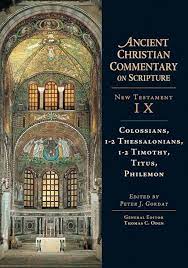
For the early church fathers, certain passages in the shorter letters of St. Paul proved particularly important in doctrinal disputes and practical church matters. Pivotal in controversies with the Arians and the Gnostics, the most commented-on christological text in these letters was Colossians 1:15-20, where Jesus is declared "the image of the invisible God, the firstborn of all creation."
The fathers found ample support scattered throughout the Pastorals for the divinity of the Son and the Spirit and for the full union of humanity and divinity in the "one mediator between God and men, the man Christ Jesus" (1 Timothy 2:5). These commentators also looked to the Pastorals for important teaching on ethics and church life.
Chief among the Eastern commentators and widely excerpted throughout this volume is John Chrysostom, praised for his pastoral insight. Other Greek commentators cited include Theodoret of Cyr, Theodore of Mopsuestia, Severian of Gabala, Ignatius of Antioch, Justin Martyr, Irenaeus, Clement of Alexandria, Athanasius, Basil the Great, Gregory of Nazianzus, and Gregory of Nyssa. Western commentators include Augustine, Ambrosiaster, Pelagius, Jerome, Hippolytus, Tertullian, Novatian, Cyprian of Carthage, Hilary of Poitiers, and Ambrose. Of particular interest for their ascetical and devotional insight are works from Syrian and Egyptian churches, including Aphrahat, Ephrem the Syrian, Isaac of Nineveh, and Philoxenus of Mabbug.
This Ancient Christian Commentary on Scripture volume opens up a treasure house of ancient wisdom that allows these faithful witnesses, some appearing here in English translation for the first time, to speak with eloquence and intellectual acumen to the church today.
The fathers found ample support scattered throughout the Pastorals for the divinity of the Son and the Spirit and for the full union of humanity and divinity in the "one mediator between God and men, the man Christ Jesus" (1 Timothy 2:5). These commentators also looked to the Pastorals for important teaching on ethics and church life.
Chief among the Eastern commentators and widely excerpted throughout this volume is John Chrysostom, praised for his pastoral insight. Other Greek commentators cited include Theodoret of Cyr, Theodore of Mopsuestia, Severian of Gabala, Ignatius of Antioch, Justin Martyr, Irenaeus, Clement of Alexandria, Athanasius, Basil the Great, Gregory of Nazianzus, and Gregory of Nyssa. Western commentators include Augustine, Ambrosiaster, Pelagius, Jerome, Hippolytus, Tertullian, Novatian, Cyprian of Carthage, Hilary of Poitiers, and Ambrose. Of particular interest for their ascetical and devotional insight are works from Syrian and Egyptian churches, including Aphrahat, Ephrem the Syrian, Isaac of Nineveh, and Philoxenus of Mabbug.
This Ancient Christian Commentary on Scripture volume opens up a treasure house of ancient wisdom that allows these faithful witnesses, some appearing here in English translation for the first time, to speak with eloquence and intellectual acumen to the church today.



